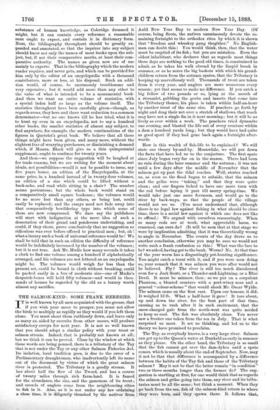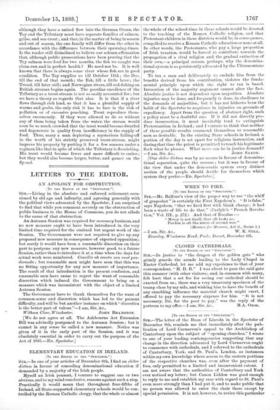THE SALMON-KIND : SOME FRANK HERESIES.
IT is well known by all men acquainted with the grouse, that if you wish your .moor to prosper, you must not allow the birds to multiply as rapidly as they would if you left them alone. You must shoot them ruthlessly down, and leave only as many as, aided by recruits from other moors, will produce satisfactory coveys for next year. It is not so well known that you should adopt a similar policy with your trout or salmon stream. Indeed, that is probably not known at all ; but we think it can be proved. Close by the window at which these words are being penned, there is a tributary of the Tay that is not under the Tay or any other Salmon Fisheries Act. Its isolation, local tradition goes, is due to the error of a Parliamentary draughtsman, who inadvertently left its name out of the document by virtue of which the great salmon river is protected. The Tributary is a goodly stream. It has about half the flow of the Tweed, and has a course of twenty *miles through rich farm-land. It is famed for the abundance, the size, and the gameness of its trout ; and crowds of anglers come from the neighbouring cities to fish in it. Also, as it is not under any law ordaining a 'close time, it is 'diligently thrashed by the natives from Auld New Year Day to modern New Year Day. (Of course, being Scots, the natives unanimously devote the re- maining fortnight to the orthodox rites by which it is shown. that " freedom and whuskey gang thegither." No English- man can doubt this.) You would think, then, that the water must be emptied of its fish ; but you are mistaken. Even the oldest inhabitant, who declares that as regards most things• these days are nothing to the good old times, is constrained to admit, as he takes his walk abroad by the limpid brook in summer, or as he notes the big baskets with which his grand- children return from the autumn spates, that the Tributary is= keeping up marvellously well. Thousands of trout are taken from it every year, and anglers are more numerous every season ; yet that seems to make no difference. If you catch a. big fellow of two pounds or so, lying at the mouth of a streamlet, gobbling the grubs and insects that come into the Tributary thence, his place is taken within half-an-hour- by another trout of the same size. If poachers go forth by night and drag their net over a stretch of shallows, that reach may have not a single fin in it next. morning; but it will be as lively as ever within a week. The poachers tried dynamite one evening, and blasted the life out of every creature within a dam a hundred yards long; but they would have had quite as good sport if they had gone back again a fortnight after- wards.
How is this wealth of fish-life to be explained? We will state our theory by-and-by. Meanwhile, we will put down the facts that have led us to the conjecture. The first spate since July began very far on in the season. There had been no rain during the later summer and the autumn ; it was not until a few days after the middle of November that the salmon got up past the tidal reaches. Well, stories reached us, as soon as the flood began to subside, that the salmon and the grilse were "taking," and that they were quite clean; and our fingers itched to have one more turn with the rod before laying it past till merry spring-time. We would take just one more forenoon, and would go to the river by back-ways, so that the •people of the village would not see us. (You must understand that, although there is no legal law against fishing in what should be close- time, there is a social law against it which one does not like to offend.) We argued with ourselves reassuringly. When so many rods are at work, what appreciable harm, we- reasoned, can ours do (It will be- seen that at that stage we- were by implication admitting that it was theoretically wrong to angle in November. The events of the day drove us to. another conclusion, otherwise you may be sure we would not write such a frank confession as this.) What was the lure to. be? we asked, having got to the bank. Worm? No. At that time- of the year worm has a disgustingly pot-hunting significance. You might catch a trout with it, and if you were seen doing so, your remark that it was salmon you were after would not• be believed. Fly ? The river is still too much discoloured even for a Jock Scott, or a Thunder-and-Lightning, or a Blue- Devil. It must be minnow, then : so we put on a corpulent Phantom, a bloated creature with a port-winey nose and a. general " colour-scheme " that would shock Mr. Oscar Wylde. The salmon came on the' first east. Upon our honour, it did.. It weighed 13 lb. What a half-hour it gave ! It tore about, up and down. the river, for the best part of that time, causing us to rush after it in such excitement, that the snow-charged gale from the north-west was quite needed to keep us cool. The fish was absolutely clean. You never saw a fresher one taken from the sea in July. That is what• surprised us most. It set us thinking, and led us to the theory we have promised to proclaim.
The Tay, as everybody knows, is a very large river. Salmon can get up to the Queen's water at Dunkeld as early in summer as they please. On the other hand, the Tributary is so small that the -fish cannot get over the dam-dykes until a spate comes; which is usually about the end of September. Now, may it not be that that difference is accompanied by a difference between the habits of the Tay fish and those of the Tributary salmon ? May it not be that the latter remain " in condition" two or three months longer than the former do? The sug- gestion is startling at first, for one would think that as regards- the salmon and grilse going into them, any river and its tribu- taries must be all the same; but think a moment. When they go, back from the sea, fish of the salmon-kind return to where they were born, and they spawn there. It follows that,
although they have a united flow into the German Ocean, the Tay and the Tributary must have separate families of salmon, grilse, and sea-trout ; and that, in the matter of being in season and out of season, the one family will differ from the other in accordance with the difference between their spawning-times. Is the reader still disinclined to believe our solemn affirmation that although public prosecutions have been proving that the Tay salmon were foul for two months, the fish We caught was clean-run and in perfect health ? He need not be. It is well known that there is always some river whose fish are in good condition. The Tay supplies us till October 11th ; the Dee, till the end of that month; the Esk, till a little later ; the Tweed, till later still; and Norwegian rivers, till rod-fishing on British streams begins again. The peculiar excellence of the Tributary as a trout-stream is not so easily accounted for ; but we have a theory as regards that also. It is that if a river flows through rich land, so that it has a plentiful supply of worms and grubs, the only risk it has to face is the risk of pollution or of excessive poaching. Trout reproduce them- selves enormously. If they were allowed to do so without any of them being taken from the water, the stream would soon be so much crowded that the trout would become dwarfed and degenerate in quality from insufficiency in the supply of food. Thus, many a man deploring a mysterious falling-off in the worth of his strictly preserved trout-stream, might improve his property by putting it for a few seasons under a regimen like that in spite of which the Tributary is flourishing. His trout would become fewer and more difficult to entice ; but they would also become larger, better, and gamer on the fly-rod.















































 Previous page
Previous page